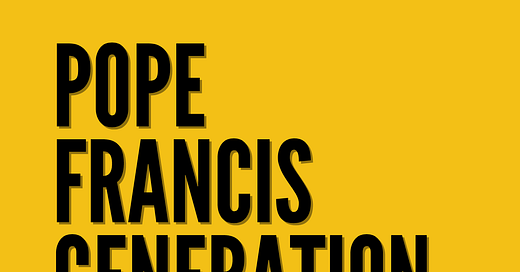Almost two year ago, Jenny Nutzman, a podcast listener all the way from Texas, randomly reached out to me. We had several phone calls about the wonderful work she was, and still is, doing at her parish to share the Church’s social teaching with her community.
We talked again recently about a synodality formation course that she has been taking and how that has continued to shape the way she understands the Church and her role in it. She also shared about an upcoming workshop that’s being held in Texas about synodality offered by the Center for Evangelii Gaudium in conjunction with the General Secretariat of the Synod.
The theme of the workshop is "Places and methods of participation in a Synodal Church" and includes specific formation in: co-responsibility and dignity of all the baptized in the mission of the Church, developing listening skills, and practicing Conversations in the Spirit.
I asked Jenny if I could help her promote the workshop. So here’s a short reflect from her about it:
Over the past several years, I’ve made a concerted effort to pull down walls instinctively built over time. Bricks laid as I continually encountered the imperative to be a defensive church at this time in history versus a one of accompaniment, walking with those wounded by living through this time. As I read Pope Francis’ description of synodality in Let us Dream, I recognized a path that could lead us through necessary healing as the Body of Christ.
This is how I became engaged with the Synod on Synodality. My involvement is not about a meeting, outcomes, or action items that stem from it. My passion for what we are doing as a universal church is fueled by this potential shift towards our roots as a synodal church – a church that walks together in unity, not uniformity. This cannot be a concept that remains in the abstract, and it cannot be enacted solely on the individual level. This must be an institutional shift towards a way of being church.
For the past year, I’ve participated in a synodality formation course offered through the Center for Evangelii Gaudium (CEG) at Sophia University Institute, in conjunction with the General Secretariat of the Synod, to sort through what bringing synodality from a concept to a lived reality could mean. A group of lay people like myself, clergy, and pastoral ministers have walked together through classes and conversations about the biblical roots of synodality, the effects of clericalism, and a much-needed reminder of our baptismal call and co-responsibility as the Body of Christ. The most life-giving part of this experience has been small group conversations with people from around the world about these topics in the context of our personal realities. These are amazing conversations and experiences in virtual formats, but they can be transformative in person when you are able to practice and collaborate face to face.
With that in mind, this is an invitation to those of you reading who feel a pull towards this endeavor. Whether you are boots on the ground in the trenches of accompaniment or figuring this out on the academic and theological level, take a moment to consider the following. In San Antonio, Texas, June 6-8, participants of Sophia University Institute’s Synodality Formation Course along with new participants are invited a three-day, in-person Synodality Formation Workshop. This will be a chance to listen, share, learn and pray with one another. Do you feel God pulling you towards this labor? Do you have experience to add to this conversation? Wherever you are, consider if you should join us in June. I would love to meet you there.
Workshop details:
Synodality Formation Workshop
June 6-8, 2024
Tymen Hall, Benson Theological Center
Oblate School of Theology, San Antonio, TX
Cost: $65 including daily boxed lunch
Registration info is on the flyer:




Paul, this San Antonio initiative looks very good. Thanks for the involvement. .I've been wondering if you, Mike and Dominic have some thoughts on the capacity of U.S. Catholics to be a synodal church. My impression is that we are far too reluctant to discuss anything at length. I've been thinking it is because we have such variety in our formations that we lack a common language. Also there is a presupposition that Catholics all believe the same thinng so no one wants to say out loud that they do not believe it. We have not been free to speak honestly. What do you think about the chances for synodality among us?